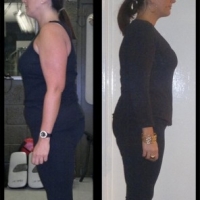Diabetes Diet: A Step by Step Guide
<p>Your health care provider may have specific instructions that go beyond the basic diabetes diet. They may also recommend that you work with a registered dietitian to manage your medication and meal timing. And, if you are newly diagnosed, they can help you learn how to monitor your blood glucose levels.
<p>Start counting carbohydrates at every meal. The American Diabetes Association and the American Dietetic Association recommend that each meal contain between 30-45 grams of carbohydrates. Get familiar with the Nutrition Facts label to make sure that you are eating the proper amount. Grams of carbohydrates per serving is listed in the middle of every label.
<p>Whether you have diabetes, successful weight loss happens when you decrease the number of calories in your diet. How many calories should you eat if you've been diagnosed with diabetes? The National Diabetes Information Clearinghouse recommends the following caloric intake to achieve weight loss. More info: <a href="http://www.lidadaidaihuaslimbuy.com"><strong>lidadaidaihuaslimbuy</strong></a>
<p>Invest in measuring cups and a digital kitchen scale so that you can measure the correct serving size of each food you eat. By exercising good portion control on the diabetes diet, you’ll make sure that you get all of the nutrients you need without going over your prescribed calorie count.
<p>Meal planning is key for people with type 2 diabetes. Schedule small meals throughout the day to keep your blood sugar levels normal. Try not to go for more than 4 to 6 hours without eating.
Carry healthy snacks with you in case you can't get to your meal in time. If you are taking medication, talk to your health care provider about timing meals and medication. Different medications respond differently to food.
<p>Try to consume fiber-rich whole grains. This includes whole wheat breads or pastas, brown rice, or quinoa. Choose these foods over similar foods made from refined flour, such as white bread or white rice. Whole grains are digested more slowly and will help you to maintain normal blood sugar levels.
When shopping for whole grains, keep in mind that the words "whole grain" or "whole wheat" should be on the label. Products that advertise that they are "wheat" or "multigrain" may not be made from whole grains.
<p>Veggies are low in calories and non-starchy varieties are also low in carbohydrates. Choose options such as broccoli, Brussels sprouts, cabbage or green beans. Learn new ways to cook vegetables and try to get 3-5 servings of vegetables each day.
<p>Try to avoid high-sugar, high-calorie, and high-fat desserts. Choose fresh fruit as your treat instead. The fiber content is great for weight loss. But keep portion control and carb counting in mind. Fruit is generally low in calories but can be high in carbohydrates.
<p>A type 2 diabetes diagnosis puts you at higher risk for heart disease. So avoid artery-clogging trans fats and saturated fats. These are often found in meats like hamburger or bacon, and in processed baked goods such as cookies and donuts.
<p>Instead, choose heart-healthy monounsaturated fats. Good sources include avocados, almonds, or olive oil. You will also benefit from consuming foods with omega-3 fatty acids. Try eating fish such as salmon, tuna, bluefish, or lake trout at least twice a week. More info: <a href="http://www.lidadaidaihuaslimbuy.com"><strong>lida diet pills</strong></a>
<p>Remember that even good fat is packed with calories, so consume them in moderation.
<p>Exercise can help to control blood sugar levels and will speed up the weight loss process. Even if you've never exercised before, it's never too late to begin a walking program or find another activity that you enjoy. If you are overweight, there are some workout programs that are well-suited for larger exercisers. Find one that you like and stick to it.
<p>Be sure to use good foot care. Wear clean socks and shoes that fit properly. Notify your doctor if you notice redness or sores that do not heal.
Related Articles
-
Weight Loss杗o More a Difficult job: Try Lida Products
People who are conscious about the health and weight have t
-
Ways To Reduce The Weight
Now a-days most of the people suffer with overweight, there are few t
-
Lose weight incredibly easy with the Indian Walnut
Have you tried losing weight before? Like most people, you’ve
-
Fat Loss 4 Idiots Diet Plan-Fat Loss 4 Idiots Review
Can you believe someone who is neither a trainer nor a nutrition exper
-
Warp Speed Fat Loss Download
Slim! Fast! Fit! Stable effect! These goals all are desired by people
-
Liposuction Thailand Female of the species
It was long believed that, in terms of cosmetic surgery, the majority
- DON'T MISS
- Week 12: My biggest challenge yet
- Get Help of Sibutramine Pills for Effective Weight Loss
- Pills To Lose Weight For Over Weight People
- Weight Loss Reviews With Real Dose
- Natural Weight Loss Supplement for an Ideal Health and Fitness
- Diets and Weight loss
- Is HCG Safe?
- Low Carb Diet Recipes - Secret Ingredients to Fast Weight Loss!
- Discover How to Lose a Fat Stomach - 4 Foods to Run From
- Living with Your Diet




